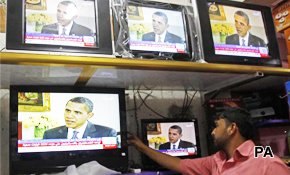...of America. An international study conducted by YouGov-Cambridge shortly before the American embassies attacks, finds that the US has a poor reputation
Only a tiny number of people have attacked American embassies across the Arab world; but an international study conducted shortly before the attacks finds that the US has a poor reputation among many millions of people who have not played – and, one hopes, never would play – any part in such violence.
The survey was conducted by YouGov-Cambridge, YouGov’s partnership with Cambridge University. Initial results were published last week by The Guardian, YouGov-Cambridge’s media partner.
Want to receive Peter Kellner's commentaries by email? Subscribe here
A range of questions demonstrate the awkward truth about America’s reputation; but the following table sums up the mood among four different international communities. We asked how much people trusted each of a range of countries and institutions to ‘act responsibly in the world’. The figures below show how many trust each ‘a lot’ or ‘a little’, versus those who ‘do not trust [them] much’ or ‘do not trust at all’.
Do you trust the following to act responsibly in the world?
Views of people in… | Britain | Germany | Middle East / North Africa | Pakistan |
United States |
|
|
|
|
Trust | 50 | 42 | 27 | 18 |
Do not trust | 41 | 49 | 63 | 78 |
European Union |
|
|
|
|
Trust | 38 | 56 | 44 | 44 |
Do not trust | 51 | 36 | 42 | 50 |
China |
|
|
|
|
Trust | 13 | 14 | 38 | 91 |
Do not trust | 77 | 77 | 49 | 6 |
Russia |
|
|
|
|
Trust | 10 | 10 | 32 | 42 |
Do not trust | 79 | 81 | 56 | 49 |
Whereas Britons and Germans are fairly evenly divided, clear majorities of people across the Middle East and North Africa distrust the US; further east, in Pakistan, in the front line of the battle against Al Q’aeda, those who distrust the US outnumber those who trust America by more than four-to-one.
That news is bad enough for Washington, given the scale of US economic aid to the very people that so distrust the US. It would seem that its role in removing Col Gaddafi from Libya and so helping the country move towards democracy has not erased its reputation for propping up autocratic regimes for so many years in Egypt and other countries, or for invading Iraq nine years ago. (Although our overall sample across the Middle East and North Africa was more than 2,200, the figures from individual countries are too small to allow reliable analysis. But in general there seem to be relatively small differences by country, although the Libyans are perhaps more favourably disposed towards the US than people in other Arab countries, despite the fact that it was Chris Stevens, America’s ambassador to Libya, who was assassinated last week.)
The bad news doesn’t end there. Compare attitudes to the US with those to Russia and China. Far fewer Britons trust either country than trust the US. But across the Middle East, trust in both is higher – and in Pakistan massively so. Whereas just 18% of Pakistanis think the US acts responsibly, 42% apply that label to Russia, and as many as 91% to China. Other results tell much the same story. For example, 66% of Pakistanis say the US can’t be trusted – but only 3% say the same of China. In fact, Pakistanis dislike the US almost as much as they dislike India.
Perhaps India provides a clue to the views of Pakistanis. For different reasons, both China and Pakistani have been at odds with India for many years. Maybe many Pakistanis feel about China as many Britons felt about ‘Uncle’ Joe Stalin’s Russia during the Second World War: my enemy’s enemy is my friend.
Some people are plainly hostile to the US because they are hostile to the West as a whole. But this is not the whole explanation. If it were, then people across the Muslim world would be as hostile to Europe as they are to the US. But they’re not. The table shows that many more trust the European Union to act responsibly in the world than trust the US. Indeed, across North Africa, the Middle East and Pakistan, trust in the EU’s role in the world is higher than it is in Britain. The table above shows the figures for the EU; we also asked about the main western European countries. The Muslim world trusts France and Britain to roughly the same extent as it trusts the EU – and trusts Germany rather more.
For all that, there are things about the US that command widespread respect across the Muslim world. It comes high up the league table of countries where people in the region would send their child for a university education, if they had the chance. (Britain and Germany also score highly; and Australia is popular among Pakistanis.)
As for the coming US presidential election, Europe and the Muslim world could scarcely be more different. By large margins, British, French and German adults prefer Barack Obama – but the vast majority of people in the Middle East, North Africa and Pakistan simply shrug their shoulders and say it matters little to them who wins.
On coming to office in 2009, President Obama made a point of reaching out to the Muslim world. As he runs for re-election, any honeymoon he enjoyed then has well and truly ended.
See the full survey details and results here
Want to receive Peter Kellner's commentaries by email? Subscribe here









